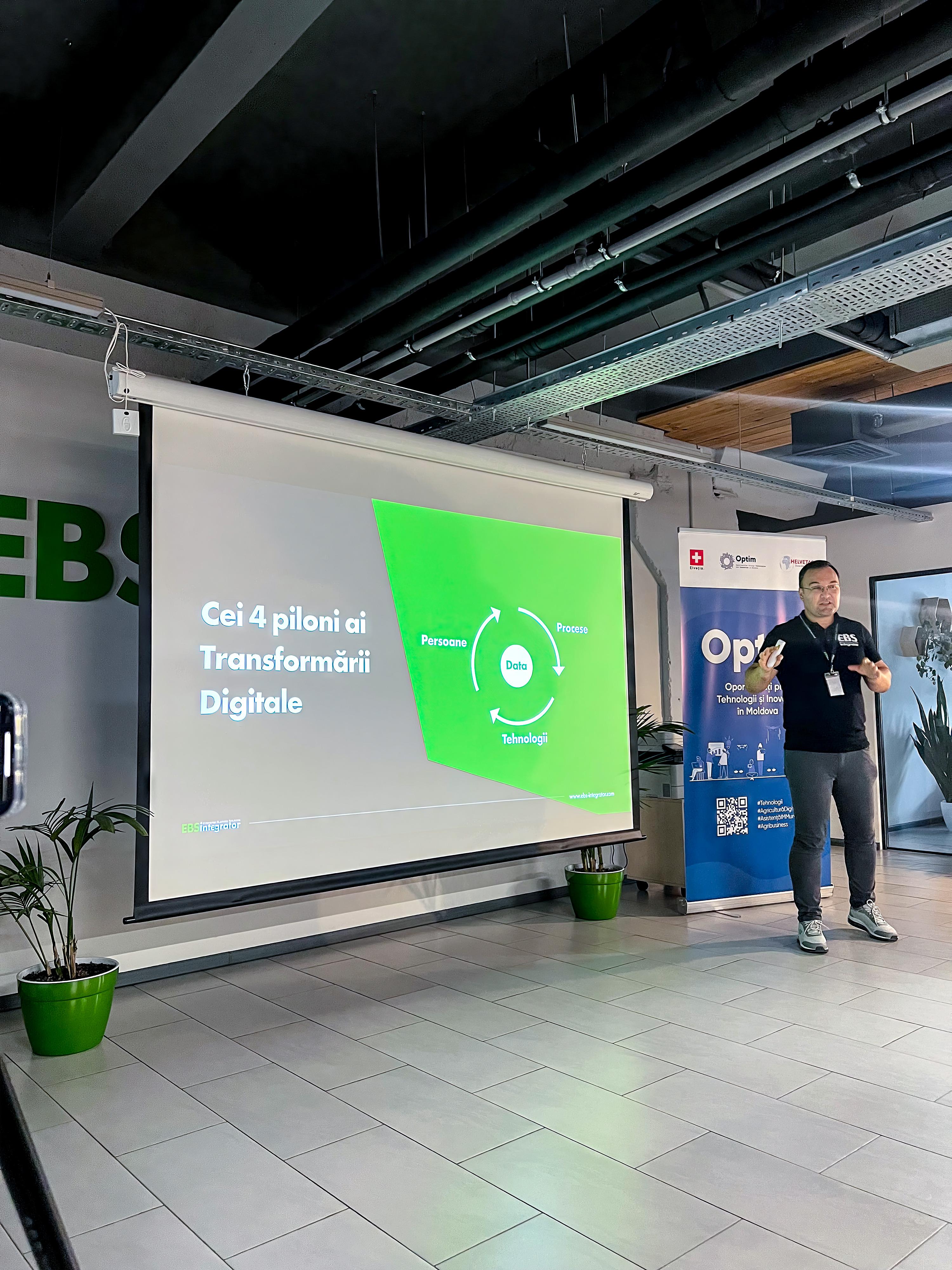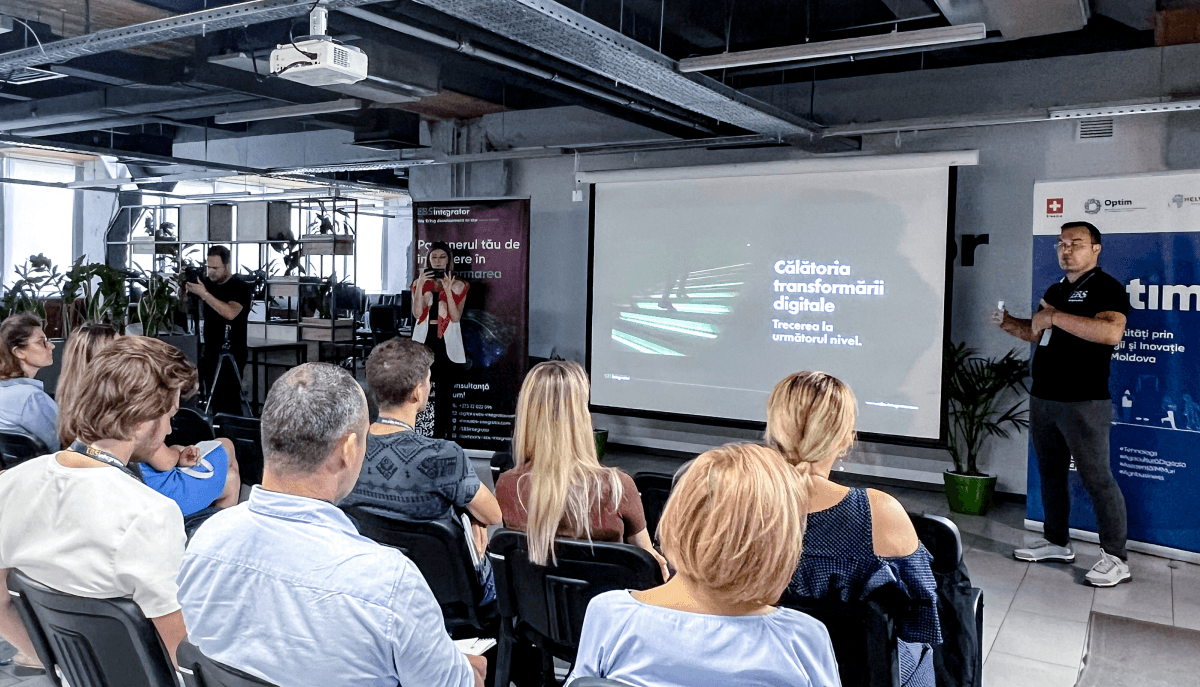
Current
12 Sep 2023
Digital transformation workshop for empowering Moldovan SMEs
In today’s rapidly evolving business landscape, #digitaltransformation goes beyond the mere implementation of technology. It represents a fundamental change in the way organizations operate, deliver value, and interact with their stakeholders. This transformation isn’t just about adopting new technologies; it’s about fostering a culture that embraces change, overcomes legacy standards, and is adaptable to change and error.
Digital transformation is a multifaceted journey. Even though its specifics vary from company to company, its essence remains consistent: a shift from conventional practices to innovative strategies supported by digital technologies. This journey often requires abandoning long-standing business processes in favor of emerging practices that are still finding their niche.
It is often driven by a clear problem statement or aspirational goal. Whether it’s improving the customer experience, reducing operational friction, increasing productivity, or improving profitability, the underlying goal is to leverage digital technologies to achieve these objectives. Business owners need to articulate what digital transformation means for their business, understanding that the term “digital” has a myriad of interpretations. It’s about customer centricity, automating operations, and introducing new business models. But at the heart of this transformation is leadership and culture. Without these, even the most advanced technologies and strategies can falter.
Global Shifts and Moldova’s Digital Evolution
Why is digital transformation so important? Because of the changing dynamics of the global business landscape, particularly in the wake of the COVID-19 pandemic. This unprecedented crisis underscored the importance of adaptability and scalability. Systems once considered infallible were put to the test, and the accelerating shift to digital platforms became apparent. The pandemic reshaped consumer behavior with a significant shift to digital platforms, a process that shows no signs of slowing.
Amid this global shift, Moldova’s digital transformation journey offers a unique perspective. A country where online commerce was virtually nonexistent until 2015, has seen a dramatic turnaround. By 2021, Moldova’s online market reached an impressive 24 billion lei, nearly doubling every two years. While this rapid growth signals potential, it also poses some new challenges for businesses to address.
We at EBS Integrator are at the forefront of this transformation, both globally and in Moldova. Recognizing the changing dynamics and increasing demand for #digitalsolutions, we have positioned ourselves as a leading force in the local digital landscape. We’re committed to providing organizations with the solutions, strategies and insights to meet their industry objectives, and we’re taking proactive steps to address the pressing needs of the digital age in a timely and accurate manner.
Workshop ‘Digital Transformation of local SMEs‘
On 7 September, we hosted a workshop on ‘Digital Transformation of SMEs’ to bring awareness to Moldovan businesses about the essential knowledge and technologies for this new era. Over a dozen local companies from different industries attended the event, all with a common goal: to harness the power of digital transformation. ATIC‘s Svetlana Gore set the tone for the event, emphasizing the critical role of digital technology in shaping the businesses of tomorrow.
Ana Tibuleac and Cristina Butuleac highlighted the synergies between our companies and the OPTIM project. They presented the “SME Digital Assessment Programme”, a strategic initiative designed to guide local companies, especially in the agri-food sector, through the complex world of digital strategies.
Then, our head of Digital Transformation, Adrian Savciuc, took center stage to delve into the core processes of digital transformation. Leveraging EBS Integrator’s twelve-year experience, we transformed abstract concepts of digital complexity into actionable insights—showcasing local businesses how to practically apply digital knowledge in their specific sectors.

We’ve delved into:
Operational integration: With more than 300 completed projects, we demonstrated how we have revolutionized the day-to-day operations of many organizations. We showcased digital solutions that streamline operations and increase efficiency—highlighting our advances in areas such as inventory management, quality control, and production planning.
Data utilization: We demonstrated the power of data-driven decision making. Using data charts and analytics, we explained how companies can modify their strategies based on real-time insights based on the four pillars of digital transformation: People, Processes, Data and Technologies.
Improving the customer experience: Attendees got hands-on experience with our interactive demos. We showed how companies can use our technology to create personalized customer journeys. How our digital solutions have significantly increased customer loyalty and satisfaction for numerous companies. This extends to our work in areas such as customer relationship management and market adaptability.
Digital strategy formulation: Leveraging our extensive experience in both local and international markets, we provided a thorough guide to creating a digital roadmap for the future. We consistently emphasized the need to align digital initiatives with an organization’s primary objectives. This includes understanding the current level of digital maturity and setting clear stages for transformation, from strategic analysis to maintenance and support.
Management and organization: We focused on the importance of process standardization, dynamic reporting, and document management. Our approach ensures that organizations can meet the challenges of the modern enterprise, emphasizing the importance of interdepartmental collaboration and human resource management.
Measuring the effectiveness of digital transformation: We highlighted the importance of measuring return on investment (ROI) in digital transformation projects. Using real-world examples, we demonstrated the components of ROI, the benefits, and how to avoid common missteps.
Our platform: We also introduced our ebs.io platform, a cutting-edge business process optimisation solution. Explaining its potential, we outlined how it can become a foundational solution for organisations looking to streamline operations and drive innovation.

The local business leaders and decision-makers in the audience responded with great enthusiasm. Our methodical approach resonated, leading to a wave of requests for customized digital assessments for their organizations.
We concluded the workshop with a productive feedback session. Attendees expressed a strong desire for further collaboration, recognizing the relevance and timeliness of the insights we shared. We deepened the conversation through an engaging Q&A segment and rounded out the day with a networking portion that fostered professional dialogue.
In sum, this workshop embodied our mission: to equip Moldovan SMEs with the essential knowledge and technology to seize the opportunities of the digital revolution.
Share this article on:
Sign up for our newsletter.
Be up-to-date with our latest news, in-depth insights, and privileged content.
Related

Agile Project Management
Cloud Computing
An In-depth Look into
This exploration takes you beyond the surface, delving deep into the intricacies of data, statistics, and their real-world implications. From deciphering trends to decoding patterns, join us in unraveling the language of numbers for a comprehensive understanding of the stories they tell.
25 Oct 2023

Software Development
Agile Project Management
Given the dynamic changes in the digital communications landscape, an Eastern European Postal Service recognised the need to modernise and adapt its operations. Aware of our proven track record, they approached us to lead their digital transformation efforts.
29 Aug 2023